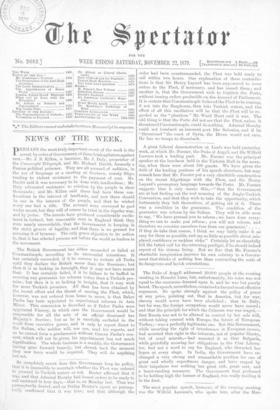The most popular speech, however, of the evening meeting was
Sir Wilfrid Lawson's, who spoke late, after the Mar- qnis of Ripon and other speakers. He complimented the meeting on having already used up the voices "of one Duke, one Marquis, one Member of Parliament, and one candidate," but reminded them that good as they were at shouting, the walls of the official Jericho would not fall down for their shouts, unless they followed them up with their votes. It was the people who had put " Dizzy " into power, and the people who had to thank themselves for what " Dizzy " had done. They had availed themselves of the first occasion on which they had the protection of the ballot to return to power a Parliament "devoted to priests, soldiers, and publicans," and of course it had applied itself to maintaining reli- gious inequality, and to smoothing the way for fighting and drinking. What he grieved over was not the loss of English money, but the loss of English character. Sir Wilfrid met the argument of the Times that the errors imputed to the Government were impossible, because the Government consisted of honourable men, by reminding the meeting of the charge of a Judge in a case of petty larceny, when the most ample testimonials had been brought to the character of the thief,—" Gentlemen of the Jnry—It is perfectly clear that the prisoner at the Bar is a man of most excellent character, and that he has stolen the broom." In short, Sir Wilfrid, though, as usual, somewhat florid in his political morality, hit the humour of the people the more, the more bitterly he reproached them for placing this Government in power, and insisted on the consequences of their own act.



































